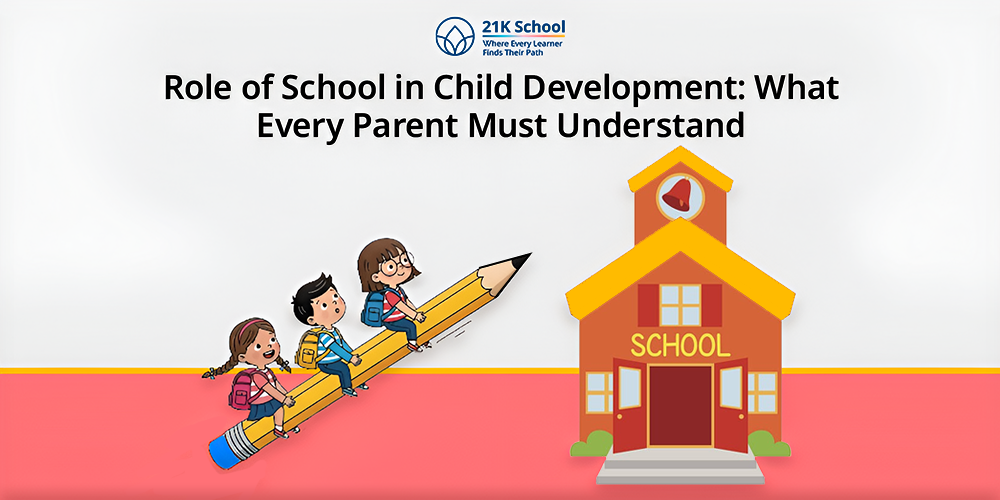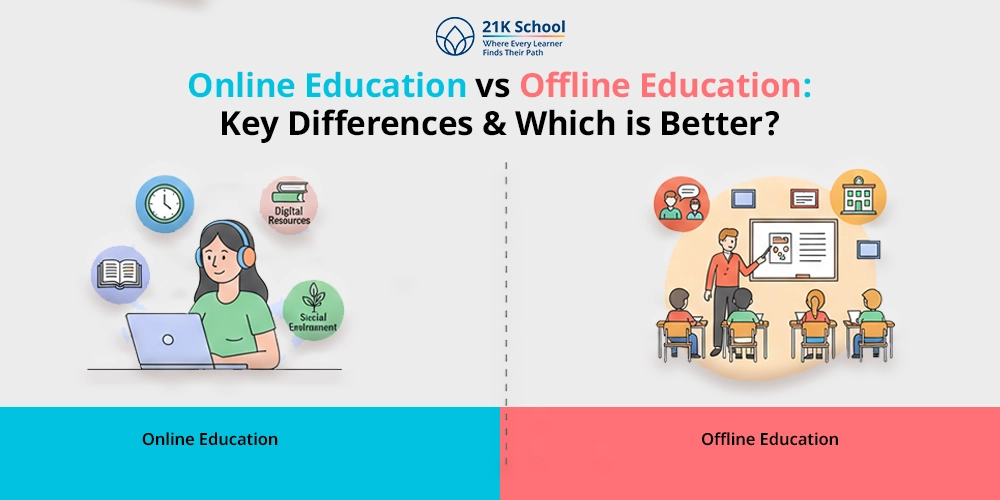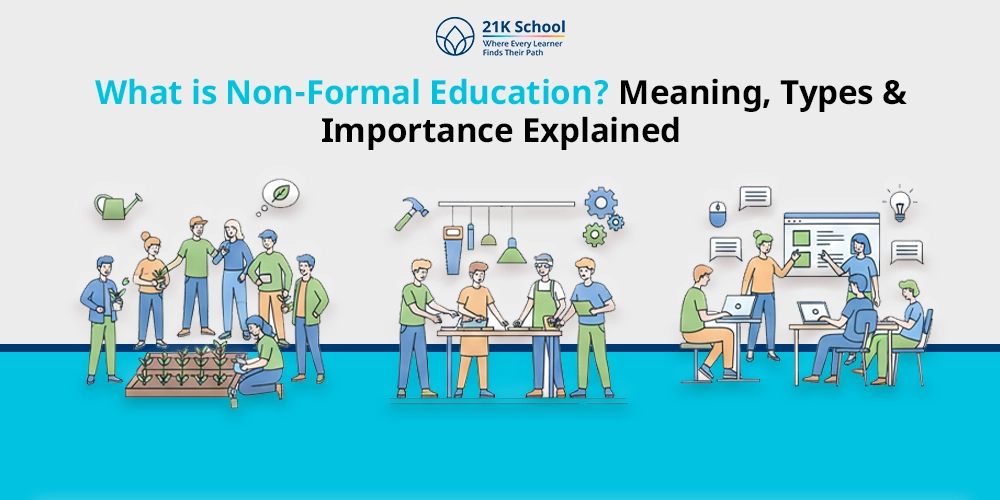
Development of children is one of the primary concerns of parents and facilitators. If you are a parent then you can feel the stress of making them academically stronger in the 21st century.
It includes the concern of mental development, academic growth and education leads everyone towards school.
School, a place where the foundation of education shapes. From a very young age school became important for kids, parents and even for facilitators.
It not only helps learners with academic achievements but also provides a supporting environment where kids can play and learn at the same time.
Let’s go in depth and understand the role of school in child development.
Contents
- 1 What is Child Development?
- 2 What Child Development is Crucial at an Early Stage?
- 3 Why Does School Climate Matters?
- 4 10 Prime Role of School in Child Development
- 4.1 1. Academic and Cognitive Development
- 4.2 2. Social Development
- 4.3 3. Emotional Development
- 4.4 4. Moral and Ethical Development
- 4.5 5. Personal Development
- 4.6 6. Language and Communication Skills
- 4.7 7. Creativity and Imagination
- 4.8 8. Career Awareness and Preparation
- 4.9 9. Cultivating Responsibility and Independence
- 4.10 10. Building Community and Citizenship
- 5 Challenges faced by Children in their Development in Schools
- 6 Conclusion
What is Child Development?
Development of children is an important procedure in an individual’s life which represents the growing time and maturity starting from birth to adulthood.
Child development consists of various changes in individuals such as social, emotional, cognitive and physical changes.
These changes or developments are crucial for every kid to fulfill their academic and non-academic activities.
What Child Development is Crucial at an Early Stage?
Development of children is important for future growth and success. The academic achievement depends on it. In learning , early childhood developments are more effective.
Development such as social-emotional growth, cognitive development, physical development, related to communication, cognitive or social emotional is more impactful. Here’s a detailed look:
- Social-Emotional Development: In children, building social and emotional development improves learners confidence , behaviour and self-esteem to manage emotions.
- Cognitive Development: Cognitive development is a useful way which teaches children analysis, investigation and finding a variety of possibilities and solutions. Early development of kids is more impactful for the future.
- Physical Development: Physical development means body movement which can be done through implementation of gross motor skills activities and fine motor skills activities . Remember to implement in a playful manner in daily life to promote physical growth in learners.
- Communication Skills: For child development at an early age communication is significant. To improve communication skills , facilitators and parents can add activities related to vocabulary and grammar. It is a foundation skill which helps to improve other skills with growing age.
Why Does School Climate Matters?
A supporting school climate mainly focuses on inclusive education , safety and guidance where learners feel valuable and motivated to learn. Benefits of positive school climate in child development:
- Academic Growth: An effective learning atmosphere in the classroom and home setting creates positive and encouraging for learners. A positive climate focuses on in-depth learning and problem solving skills .
- Behavior and Discipline: Kids grow and develop good behaviour and discipline in a learning environment. This reduces bullying, disciplinary issues and promotes good behavior towards peers.
- Emotional Well-being: Emotional wellness in the classroom improves confidence, reduces anxiety and guides learners to develop resilience. Controlling and management of emotions makes other people comfortable in the classroom.
10 Prime Role of School in Child Development
There are various roles the school plays in the development of children from academic improvement to character building.
Here you can go through a detailed information:
1. Academic and Cognitive Development
Children’s academic and cognitive development is essential. School should provide a positive learning environment and promote intellectual curiosity.
This combination enhances their knowledge, improves thinking skills and builds their character in society.
Introduction of various subjects and streams can help them academically where students can ask questions, research and analyse the solution. This will improve memorizing problem solving and retaining skills.
Also, explore various engaging memory games for kids learning.
2. Social Development
Schools can’t neglect the development of social skills which impact both personal and professional growth of learners.
With a positive learning environment, peers and facilitators collaboration, and other social skills such as communication, conflict resolution, project creation, learners can ensure social development.
Improve learners’ academic abilities by exploring the importance of social skills . This leads to increased confidence, self esteem and cultural awareness.
3. Emotional Development
Experiencing various emotions at once can be challenging and create a complicated situation for learners. However, school can be an ideal place to learn emotional development.
Various creative activities like winning a race, failing a test or getting a prize have different emotions which individuals deal with in school.
To manage, control and express the right emotion at the right time, facilitators, classmates and counselors help learners how to deal with it.
4. Moral and Ethical Development
Moral and ethical development are two most important parts which kids learn from a young age in their schools.
Learn the importance of moral education in students’ lives.
With the help of various methods like storytelling in learning , school rules and regulations, classroom discipline and management teachers help in improving child development.
By this way kids can become honest, fair with others, give and take respect and show kindness towards each individual.
5. Personal Development
The role of school is not limited to academic achievements and improving high scores in exams . It also works on personal development of learners.
Personal development helps them to self identify which increases their confident strength and guides them to improve weaknesses.
School helps them to understand and recognize self identification by providing the right directions and life lessons for growth.
6. Language and Communication Skills
Learners most of the time deal with language barriers which leads to low communication skills . However, school surroundings can be a helpful environment to learn different languages.
Learners can take language classes and practice with facilitators and peers to improvise. Facilitators also provide vocabulary grammar reading and writing classes.
This will help them to connect with others for fulfilling both professional and personal needs. Also, read the importance of language skills from early childhood.
7. Creativity and Imagination
In today’s education creativity and imagination play an important part in students’ lives. These 21st century skills are taught by schools to provide freedom of learning.
Understand why creativity is important to a childs development and growth.
This flexible learning encourages various creative skills such as music, art, drama, writing including imagination to think of unique painting or solution.
It directly leads to innovation, originality and creativity which increase curiosity and interest towards learning something new.
8. Career Awareness and Preparation
Other than providing education of particular grade schools also guide learners about further career awareness and preparations.
Knowledge and precision in career help them to select the right aptitude tests, course selections, internship etc.
Career awareness and exam preparation are also beneficial for time management skills , improve digital literacy and enhance thinking skills.
9. Cultivating Responsibility and Independence
School also helps learners to take responsibilities related to homework , classroom activities and work on feedback.
The main purpose of making them responsible is to guide them for fulfilling future needs without depending on others.
By this way learners can make the right and independent decision for further studies and exam preparation.
10. Building Community and Citizenship
Schools provide a positive learning environment where individuals can build community and citizenship on their own.
The more they grow and proceed to the next grade, they connect with other people to work on different project-based learning , outdoor activities and school events.
With civics lessons, environmental projects, community service activities it guides learners to understand their role as community and national citizens.
Challenges faced by Children in their Development in Schools
For learners, school is the most important and first priority for development of both personal and professional progress.
Some common challenges faced by children in their development in schools are:
1. Academic Pressure and Competition
To get good marks and ranking learners mostly stays under academic pressure and competition of becoming first.
This study stress , anxiety, result day can impact the study which leads to burnt out.
2. Bullying and Peer Victimization
Physical, verbal and digital bullying can impact badly which directly reduces self esteem, confidence and motivation of learning.
It can also make learners shy and be introverted, especially in front of classmates or in school.
3. Educational Inequity
Unable to access effective education materials, qualified facilitators and enhancement activities etc are some common issues/challenges faced by individuals.
Conclusion
Effective development for kids ensures their further growth especially in academics.
From inclusive classrooms , collaboration with peers to global collaboration via digital platforms can be accessible.
With the help of holistic education learners can now access open and distance learning to improve academic performance .
Work together with school and teachers to build a supportive learning experience for your child learning journey. To know more visit us at 21K School .



